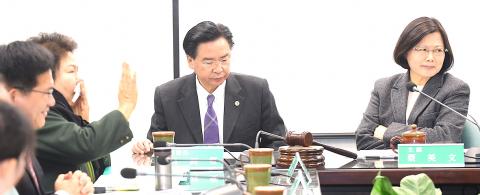The Democratic Progressive Party’s (DPP) Central Standing Committee yesterday unveiled its schedule for selecting nominees to represent the party in next year’s presidential and legislative elections, triggering divided reactions among party figures.
“[DPP] Chairperson Tsai Ing-wen (蔡英文) has briefed committee members during the meeting on the nomination schedule, and none had other opinions,” party spokesman Lin Chun-hsien (林俊憲) told a brief press conference after the committee meeting yesterday afternoon.
“Most members believed that the party performed well in [last year’s] nine-in-one elections because it planned ahead, and therefore agreed that the party should accelerate the nomination processes for president and legislators,” Lin said.

Photo: Liu Hsin-de, Taipei Times
According to the party’s schedule, the official announcement for the presidential primary election will be posted on Feb. 11. Registrations will be accepted from Feb. 12 to Feb. 16, and negotiations for the presidential nominees will end on Feb. 24. The primary campaign will be held from Feb. 26 to March 15, followed by an opinion poll from March 16 to March 18 to gauge the popularity of the presidential contenders, Lin said.
As for the legislative elections, the announcement for the primary will be posted on Feb. 26, the registration period will run from March 2 to March 6, and an opinion poll will be conducted from March 19 to April 10, Lin said.
“The lists of nominees for president and legislators will be made public on April 15,” he said.
Opinion on the nomination calendar appears to be divided.
“There is nothing bad about getting the nominations done earlier,” DPP Legislator Huang Wei-che (黃偉哲) said.
“Compared with 2012, the process has been moved earlier by a month this time; this way, we can get things settled earlier, and get ready for the election earlier,” Huang added.
DPP Legislator Tsai Huang-liang (蔡煌瑯) agreed, saying: “It is earlier this time, but not really that much earlier, so there should not be much of a difference.”
“What is more important is whether the nomination mechanism is fair,” Tsai said.
Former premier Frank Hsieh (謝長廷) disagreed, saying it might not be a good idea to start the nomination process at a time when legislative by-elections in five electoral districts are ongoing.
DPP Legislator Wu Ping-jui (吳秉叡), a close ally of former premier Su Tseng-chang (蘇貞昌), who is widely expected to be a presidential contender, agreed that starting the nomination process early might not be good for the ongoing legislative by-elections.
“I think we also need to be considerate about party employees and begin the nomination process after the Lunar New Year holiday so that they can enjoy the holiday,” Wu said.
Su also questioned whether “it is necessary to do it in such a hurry.”
On the other hand, Greater Tainan Mayor William Lai (賴清德) said that he “respects the decision by the Central Election Committee,” as “the party must have its own considerations.”
Amid speculation that he is also eyeing the presidency, Lai said he does not plan to register in the primary.

Taipei has once again made it to the top 100 in Oxford Economics’ Global Cities Index 2025 report, moving up five places from last year to 60. The annual index, which was published last month, evaluated 1,000 of the most populated metropolises based on five indices — economics, human capital, quality of life, environment and governance. New York maintained its top spot this year, placing first in the economics index thanks to the strength of its vibrant financial industry and economic stability. Taipei ranked 263rd in economics, 44th in human capital, 15th in quality of life, 284th for environment and 75th in governance,

Greenpeace yesterday said that it is to appeal a decision last month by the Taipei High Administrative Court to dismiss its 2021 lawsuit against the Ministry of Economic Affairs over “loose” regulations governing major corporate electricity consumers. The climate-related lawsuit — the first of its kind in Taiwan — sought to require the government to enforce higher green energy thresholds on major corporations to reduce emissions in light of climate change and an uptick in extreme weather. The suit, filed by Greenpeace East Asia, the Environmental Jurists Association and four individual plaintiffs, was dismissed on May 8 following four years of litigation. The

A former officer in China’s People’s Liberation Army (PLA) who witnessed the aftermath of the 1989 Tiananmen Square massacre has warned that Taiwan could face a similar fate if China attempts to unify the country by force. Li Xiaoming (李曉明), who was deployed to Beijing as a junior officer during the crackdown, said Taiwanese people should study the massacre carefully, because it offers a glimpse of what Beijing is willing to do to suppress dissent. “What happened in Tiananmen Square could happen in Taiwan too,” Li told CNA in a May 22 interview, ahead of the massacre’s 36th anniversary. “If Taiwanese students or

The New Taipei City Government would assist relatives of those killed or injured in last month’s car-ramming incident in Sansia District (三峽) to secure compensation, Mayor Hou You-yi (侯友宜) said yesterday, two days after the driver died in a hospital. “The city government will do its best to help the relatives of the car crash incident seek compensation,” Hou said. The mayor also said that the city’s Legal Affairs, Education and Social Welfare departments have established a joint mechanism to “provide coordinated assistance” to victims and their families. Three people were killed and 12 injured when a car plowed into schoolchildren and their